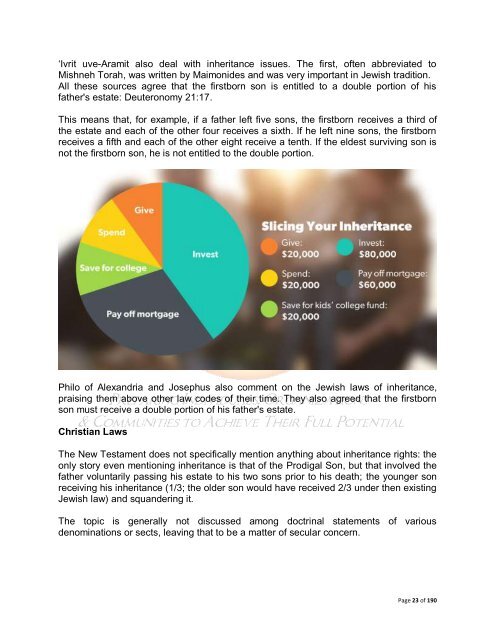Wills, Trusts & Estates
Wills, Trusts & Estates
Wills, Trusts & Estates
Create successful ePaper yourself
Turn your PDF publications into a flip-book with our unique Google optimized e-Paper software.
ʻIvrit uve-Aramit also deal with inheritance issues. The first, often abbreviated to<br />
Mishneh Torah, was written by Maimonides and was very important in Jewish tradition.<br />
All these sources agree that the firstborn son is entitled to a double portion of his<br />
father's estate: Deuteronomy 21:17.<br />
This means that, for ex<strong>amp</strong>le, if a father left five sons, the firstborn receives a third of<br />
the estate and each of the other four receives a sixth. If he left nine sons, the firstborn<br />
receives a fifth and each of the other eight receive a tenth. If the eldest surviving son is<br />
not the firstborn son, he is not entitled to the double portion.<br />
Philo of Alexandria and Josephus also comment on the Jewish laws of inheritance,<br />
praising them above other law codes of their time. They also agreed that the firstborn<br />
son must receive a double portion of his father's estate.<br />
Christian Laws<br />
The New Testament does not specifically mention anything about inheritance rights: the<br />
only story even mentioning inheritance is that of the Prodigal Son, but that involved the<br />
father voluntarily passing his estate to his two sons prior to his death; the younger son<br />
receiving his inheritance (1/3; the older son would have received 2/3 under then existing<br />
Jewish law) and squandering it.<br />
The topic is generally not discussed among doctrinal statements of various<br />
denominations or sects, leaving that to be a matter of secular concern.<br />
Page 23 of 190

















